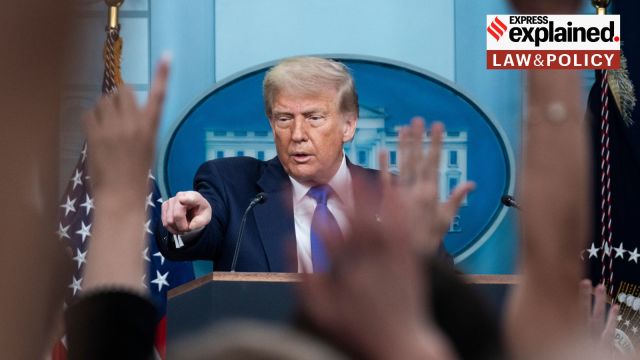The United States Supreme Court on Friday removed a significant roadblock to President Donald Trump’s controversial executive order ending birthright citizenship for immigrants.

The US Supreme Court is yet to rule on the legality of Trump’s executive order issued on January 20, the very first day of his second stint as President. However, it has removed protections granted by federal judges which have thus far hindered the implementation of the law
Story continues below this ad
Ending birthright citizenship
A part of his larger anti-immigration policies, one of Trump’s key poll promises was to end birthright citizenship for immigrants. Essentially, children born in the US to parents unlawfully present or present on temporary visas would not automatically be granted citizenship.
Citizenship in the US is defined by the 14th Amendment to the US Constitution, ratified in 1868. The provision was introduced to extend citizenship to Black Americans, who had been excluded till then. It states: “All persons born or naturalised in the United States, and subject to the jurisdiction thereof, are citizens of the United States and of the State wherein they reside.”
The 14th Amendment also bars the state from making any laws that infringe the rights of any US citizens. These protections are similar to those in Article 14 of the Indian Constitution.
Trump’s executive order plays on the interpretation of the words “subject to the jurisdiction thereof” to hold that certain people — undocumented immigrants or those without legal status — are not covered by the 14th Amendment, and hence not automatically eligible for birthright citizenship.
Court orders blocking the move
Story continues below this ad
India has a unitary legal system. High Courts issue injunctions against the state but are, in some cases, limited by jurisdiction, while the SC’s orders have a nationwide impact. That said, universal injunctions against non-state actors are common in certain kinds of orders, such as content takedown directions or in intellectual property disputes.
In contrast, the US legal system has a complex dual structure where both federal Courts (established under Article III of the US Constitution) and state courts (established by each state’s constitution and laws) operate. The federal courts are a three-tiered system, with 94 federal District Courts, 13 Courts of Appeals over them, and at the top, the US Supreme Court.
These federal courts are not limited by state jurisdiction. This is what allowed several federal district courts to immediately block the enforcement of Trump’s January 20 order.
On January 23 itself, a federal district judge in Washington issued a temporary restraining order, followed by a preliminary injunction on February 6. And those challenging the law include state governments — a collective suit by Washington, Arizona, Illinois, and Oregon got the first injunction — and advocacy groups. The US government made an appeal to the Supreme Court against relief granted in a suit filed by advocacy groups CASA de Maryland and Asylum Seeker Advocacy Project on behalf of pregnant women whose children could be denied citizenship.
Story continues below this ad
Universal injunctions by federal courts have dealt a blow to several of Trump’s policies — from a law requiring voter ID and proof of citizenship at the polls, freezing of federal funding to the states, to making federal funding to schools conditional on their removing all diversity and equity policies.
The New York Times quoted a report by the research arm of the US Congress that currently “more than two dozen nationwide injunctions” are in place blocking Trump’s policies.
Supreme Court’s decision
The White House appealed against the Maryland injunction, and the Supreme Court, which now has conservative judges (appointed by Republican Presidents) in majority, ruled in favour of Trump. The Court did this by limiting the power of federal judges to issue universal injunctions.
Taking note of the argument that universal injunction “give[s] the Judiciary a powerful tool to check the Executive Branch,” Justice Amy Coney Barrett said in her opinion, which is essentially the majority view in the case, that it is not for district judges to act as a check against the executive.
Story continues below this ad
Even when “a (federal) court concludes that the Executive Branch has acted unlawfully, the answer is not for the court to exceed its power,” she wrote.
The Supreme Court, however, said that the existing injunctions can be narrowly tailored to each plaintiff (the party who has moved court alleging violation of her rights) with standing to sue.
The decision makes it difficult to block Trump’s policies quickly, not just on birthright citizenship but any policy. District Courts are more accessible, and it is less time-consuming to get relief from them compared to waiting for a final verdict from the Supreme Court on controversial issues.








































